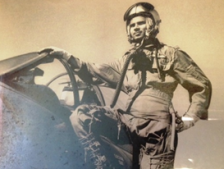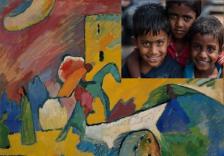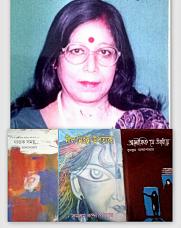
Sukhwant Singh, our CGO - Kolkata Branch, shares a precious memory of this day.
26th January is a day when India celebrates and honours the momentous event of ...
Sukhwant Singh, our CGO - Kolkata Branch, shares a precious memory of this day.
26th January is a day when India celebrates and honours the momentous event of India’s Constitution came into force in the year 1950. For me, this is the day when we showcase to the world our military strength, our rich cultural heritage, our achievements as a nation, and our unity in diversity.
In the year 1989 I had the privilege of participating in the Republic Day Parade at Rajpath in New Delhi, as part of a marching contingent of the Sea Cadet Corps. We left Calcutta (as it was called then) in the first week of January, filled with excitement and joy and somewhat prepared for the harsh and cold winter weather of New Delhi. We were provided lodging in the Single Sailor Complex near Chanakyapuri. To add more spice, our camp beds were neatly arranged on the 9th floor balcony of the building, with adequate insulation and heating arrangements to cope with the zero degree temperature conditions. The administration had taken special care to ensure that the dining area was on the ground floor, so for each meal we had to go from the 9th floor to the ground floor and back. And since there were were no elevators, all that climbing up and down made sure that we had enough exercise to keep ourselves warm and fit.
Every day we would get up around 4 a.m. and post our morning routines and a quick cup of tea, we would board the Army 4 tonne truck to reach Rajpath. We would practise marching from 5.30 a.m. to 7 a.m. We would then return to the base by 8 a.m., have breakfast and take rest. We would have another round of practise post lunch, from 3 p.m. to 4 p.m. This was the routine for two weeks to gear up and be ready for the big day.
The dress rehearsal was on 23rd January and it is on this day that the winners in the various categories are judged and finalised. Finally, after weeks of rigorous practise, we were all ready for the D-Day, and on Thursday 26th January, 1989 we proudly marched down Rajpath, while synchronising our steps with the beat set by the band. All the VIP and dignitaries present in the gallery applauded and cheered loudly as we saluted President R Venkataraman, who was accompanied by the Chief Guest, General Secretary Nguyen Van Linh from Vietnam.
This day will be forever etched in my memory as the beat of the band, the music, the marching boots and the cheering crowd reverberate in my heart whenever I think of this day…. JAI HIND!!
Want to share your experience? Please mail your story to writetous@supportelders.com with your name

Professor Manoj Kumar Ghosh, one of our members, retired professor and Dean, Academic Affairs, IIT Kharagpur, shares some unforgettable memories during and after his tenure at IIT Kharagpur with Mousumi Gupta.
“The ...
Professor Manoj Kumar Ghosh, one of our members, retired professor and Dean, Academic Affairs, IIT Kharagpur, shares some unforgettable memories during and after his tenure at IIT Kharagpur with Mousumi Gupta.
“The teacher student relationship is the key to success for both teacher and student,” says Professor Ghosh. For teachers, it is their satisfaction in the positive impact they create and for students, it is a successful preparation for the journey to face the challenges of life. The relation between a devoted teacher and a motivated student is one of the most fundamental relationships that has a great impact in the formation of our society.
Every student has different strategies for learning and achieving his/her goals. According to Professor Ghosh, a teacher needs to understand the capability of each student and set the teaching standard accordingly. A teacher needs to be approachable and communicate with students in an agreeable manner, so that students are able to share their views and queries— this is very important and helps teachers to understand the ability and intellectual capacity of students. Teachers need to continuously monitor their students to be aware of any difficulties, problem, fear, or confusion they may be dealing with.
Professor Ghosh is filled with pride when he speaks about some of his students, who have passed out many years back and are now settled across the globe. One of his students, who is now well established in the US, invited him to his house during the professor’s personal visit to the US. Professor Ghosh was pleasantly surprised to find that his student still cherished his years spent at IIT KGP and the relationships he shared. He still harboured sentiments of great respect and affection for those who mentored him there. This shows that mutual respect and trust are the foundation of any long-lasting relationship.
Due to the strong and amicable relationship Professor Ghosh shared with his students, he actively advocated the anti-ragging policy in the IIT KGP hostel campus, During his tenure he was in fact in charge of one of the ladies’ hostels. Behind the facade of welcoming new students, seniors who tend to show their power and rag newcomers. Though often friendly and fun, this can also veer towards being exploitative and unhealthy. Once, when Professor Ghosh was going around the hostel, he saw a gathering of senior and junior students in one of the rooms of the hostel. He enquired into it. The senior girls said, “Sir, we are summarising the rules of IIT to the newcomers to integrate them into the system. If they don’t abide by these rules, they will have adjustment problems in coming years.” Professor Ghosh’s strict admonishment stopped the untoward incident that could have happened otherwise on that day. Of course, he had to face strong resistance from his students, when he tried to stop ragging, but he took it in his stride as he had the support of the IIT authority.
He was both strict and caring towards his students, to whom—he was more of a father and guide. He aptly summarised the relationships in these words, “I treat my students as my kids because in the time we spend together, they are not just names on a class list, they become a part of my heart. And on their part, their young mind rejuvenates mine, making me mentally young and contemporary”.
He is currently associated with a college in Kolkata and teaches MTech students and devotes major time in mentoring teachers. “The role of a good teacher in an educational platform is the same as that of a good mother in the society,” says Professor Ghosh. His immense enthusiasm, passion and concern for his students is palpable and very inspiring.
Want to share your experience? Please mail your story to writetous@supportelders.com with your name

This Vijay Divas, Mousumi Gupta brings to us the experience of our member, Mrs Arundhuti Samanta, wife of Sqr Ldr AB Samanta, who embraced martyrdom during the 1971 Bangladesh Liberation War, being felicitated by Bangladesh Prime Minister Sheikh Hasina. This Vijay Divas, Mousumi Gupta brings to us the experience of our member, Mrs Arundhuti Samanta, wife of Sqr Ldr AB Samanta, who embraced martyrdom during the 1971 Bangladesh Liberation War, being felicitated by Bangladesh Prime Minister Sheikh Hasina. It was just another March day when Mrs Arundhuti Samanta received a call from an Air Force officer from Barrackpore, who expressed her wish to meet Mrs Samanta, to which the latter readily agreed. Accompanied by two other officers, the lady officer came to meet Mrs Samanta at her residence. Mrs Samanta was deeply touched to know that Bangladesh Prime Minister Sheikh Hasina wanted to felicitate seven Indian war martyrs for their invaluable contribution and supreme sacrifice in the Bangladesh Liberation War and her husband, Sqr Ldr AB Samanta, was one of them. The programme was to be organised at the Manekshaw Centre in New Delhi on April 8th, 2017. Initially, Mrs Samanta was a bit hesitant because she had had her knee replacement surgery just a few months back. The Air Force officers, however, assured her that her comfort and safety was going to be their responsibility. They also said that one person could accompany her. Since her son is settled in the US, she promptly called her younger sister to request her to accompany her as she had to tell the officers the name of the person who would accompany her. She also shared the news with her daughter-in-law and son. Her son, who was moved and excited to hear about it, expressed his wished to come to India to attend the ceremony. She then called up the Barrackpore Air Force station for permission to allow two people to accompany her; they gladly granted her request. Right from Kolkata airport, Mrs Samanta was very well looked after. She was ushered in by Air Force officers, who ensured that she was comfortably seated on the flight and assured her that Air Force officials would take over at Delhi airport. When Mrs Samanta landed in Delhi, Air Force officers welcomed her and took her to the Air Force guest house in New Delhi, where they were to stay. Her son, who had reached Delhi the night before, had also been escorted to the guest house. All the seven recipients of the award and their family members were then taken to the Manekshaw Centre for prior stage exercise for the programme. On 8th April, the programme started after a light lunch at around 3.30 p.m. The dignitaries onstage included Bangladesh Prime Minister Sheikh Hasina, Indian Prime Minister Mr Narendra Modi, External affairs Minister Mrs Sushma Swaraj and Finance Minister Mr Arun Jaitley. It was truly a trip down the memory lane for Mrs Samanta and a precious experience for her son, who had lost his father at a very tender age. The moment, though undoubtedly the proudest for the family, was also filled with grief, especially when there was the announcement about Sqr Ldr AB Samanta – “An air force fighter pilot, who carried out a raid on Dhaka in Bangladesh before the enemy fire shot down his plane over Tejgaon in December 1971, while he was on a mission and made a supreme sacrifice for the country.” Mrs Samanta, filled with pride at her husband’s bravery, insisted on walking to the stage but the Air Force officers didn’t want to take any risk, so she was wheeled to the stage. She was, however, allowed to walk on her own to receive the felicitation from the Bangladesh Prime Minister Sheikh Hasina. The following day Mrs Samanta was again escorted back to Kolkata with full care and respect while her son went back to the US with this unforgettable memory, feeling undeniably proud of his father. Forty-six years after the finest military victory, we salute these heroes, who far from home and loved ones, sacrificed their lives for the nation. The stories of their courage and passion are larger than life. Want to share your experience? Please mail your story to writetous@supportelders.com with your name

This Children’s Day, one of our members, Mrs Ruby Banerji, shares her experience of espousing the cause of underpriviledged children with Mousumi Gupta.
“Will you come to meet us every ...
This Children’s Day, one of our members, Mrs Ruby Banerji, shares her experience of espousing the cause of underpriviledged children with Mousumi Gupta.
“Will you come to meet us every day Dida? Will you come with us to our house?” That was the first reaction Mrs Banerji got when she became associated with Divine Life Mission, several years back. Though their house is nothing but a plastic cover over their head, yet they felt proud and happy to show it to her. Their unconditional love made her feel that they too deserved to feel safe, valued, and loved and she began to work to better the lives of these street children. Mrs Banerji empowers the street children with skills and attitude to make them socially acceptable and have a positive outlook in life. She arms them with skills that will help them to at least earn enough to meet their basic needs in future, and also helps them to envision goals for themselves and motivates them to achieve their dreams.
She is associated with two schools that work for street children—one at Swinhoe street and the other at Garcha. She had initially decided to teach children under 10 years because she thought, and was also advised by her mentor at Divine Life Mission, that if something is taught to children at such a tender age, it gets reflected in their moral behaviour. But one day, she saw a few children between 12 to 14 years watching her from a distance. When she went up to them and enquired, they replied “Can you please teach us? We are all school dropouts”. That was the biggest reward for her sincerity and efforts, and that was the kind of attraction they felt towards her. She couldn’t ignore their earnest plea and decided to take them under her wing. And now she is excited to mention that one of them is preparing for class 10 board exams. The children are so attached to her that now, when she gets down from her car near the school, they are eager to help her and compete with eachother about who will carry her bag, who will help her to climb the stairs and so on. It is indeed heartwarming to see the sparkle in her eyes when she talks about them.
Mrs Banerji now has some volunteers, who are as dedicated as her, and help her to teach these children different subjects like drawing, dancing and singing. They also provide meal for the children every day. The children celebrate all the important calendar days, which not only gives them the opportunity to showcase their learning and talent, but also teaches them about the importance of those days. New clothes are distributed during festivals for Mrs Banerji believes that just like the privileged section of this society, they too deserve to wear new clothes during festivals.
Mrs Banerji is extremely happy to do something for the society and feels amply rewarded by their love and respect for her. Mrs Banerji does not celebrate children one calendar day but the whole year around!
Want to share your experience? Please mail your story to writetous@supportelders.com with your name

Our member Kumkum Banerjee talks to Rimjhim Bhattacherjee about her illustrious career with the All India Radio.
As a young girl, did you always aspire to join the AIR?<...
Our member Kumkum Banerjee talks to Rimjhim Bhattacherjee about her illustrious career with the All India Radio.
As a young girl, did you always aspire to join the AIR?
- No, it was entirely serendipitous. I had completed my Masters and was working on a patrika named Ekaleen with great zeal. A few of my friends and I had started it and we handled the all the work— from gathering material to arranging for its publication. Writers like Sunil Gangopadhyay, Shirshendu and Shankha Ghosh wrote for us.
Meanwhile, a brother of mine heard of the vacancy at AIR. He himself filled the form, made me sign it and delivered it. When I received the joining letter, it was for AIR Siliguri. It wasn’t possible for me to join there. I let AIR know that. Finally, Indira Devi herself wrote to me to join AIR Kolkata. I couldn’t believe it. It was as if the job was meant for me.
What was your work like at the AIR?
- It was challenging in the beginning, like all new jobs are. I had to learn the art of queuing, fading in and fading out and so on. I learnt quickly and well. Soon, even artists were praising my work. I usually didn’t do announcements; I worked for special shows like Mahilamahal and so on. I got transferred to various departments as the years wore on but everywhere my work was met with enthusiasm and praise.
Can you share with us some of your golden moments at work?
- I worked with the AIR for a long 38 years. Asking me to relate a few golden moments would be like looking for needles in a haystack. (laughs)
I cherish the entire journey and the people I had the opportunity to meet, interact and work with. I still cannot forget the day I spoke to Pankaj Kumar Mullick. I stood staring at him in total awe. I was a little child when he had composed the music for ‘Diner sheshe ghumer deshe.’ When I asked him about it, he told me how he had visited Rabindranath Tagore and presented the composition before him with a lot of trepidation. Can you imagine the good fortune of meeting such people and hearing stories like these almost every day?
The day I met Birendra Krishna Bhadra also remains indelible. Nobody would look at the slim, fair man and imagine that he would have as powerful a voice as he did.
Tell me some more about the people you had the opportunity to work with.
- (laughs) This can take ages. People like Kanan Devi and Manju Dey left deep impressions on me. I have never met a woman as genteel and as warm as Kanan Devi.
Did you know Manju Dey drove and could even change the tires of her car herself?!
They were women who both inspired me a great deal. Apart from this, I have worked with the likes of Gouri Ghosh, Sarajubala Devi, Suchitra Mitra, Kanika to modern day artists like Moonmoon Sen and Rupa Ganguly.
And you are an artist in your own right…
- (smiles embarrassedly) I wrote and I used to recite but I was never one for self-publicity. I love poetry and I still recite when acquaintances ask me to. I have also written several songs and books of poetry, rhymes and other writings. As I said, I never liked to publicise but people close to me know that I write.
What would you say is your greatest achievement?
- I don’t look at achievement in terms of awards or as a solitary great event. For me, my achievement lay in my building friendships with certain artists, which went much deeper than the strictly professional. It lay in my work being deeply appreciated by artists and audience alike. My name used to be announced for some shows I hosted or organised. I had people writing to me from both Kolkata and Bangladesh telling me how much they liked my show and the way I presented it. I still have some of those letters. Once, a young boy from Bangladesh even visited my house to congratulate me on my work! I have had several letters inviting me to visit Bangladesh, but that has not been possible as yet.
Is there anything in particular that you would like to share with your readers?
- I’ve often been asked what I did to maintain my voice. I always laughed when I heard this question because I really took no special effort. I think that if we love our work enough so much so that it becomes a passion for us, it will always express itself in the work we produce. It becomes unnecessary then to focus on ancillary things.
I’ve learnt another thing from my interactions with all the artists and great people I’ve had the fortune to meet. The greater you grow in Art, the more humble you become and the more respectful towards others. When your profession teaches you so much, you know you’ve lived a fulfilling life and the journey, with its ups and downs, was completely worth the effort.
Want to share your experience? Please mail your story to writetous@supportelders.com with your name

